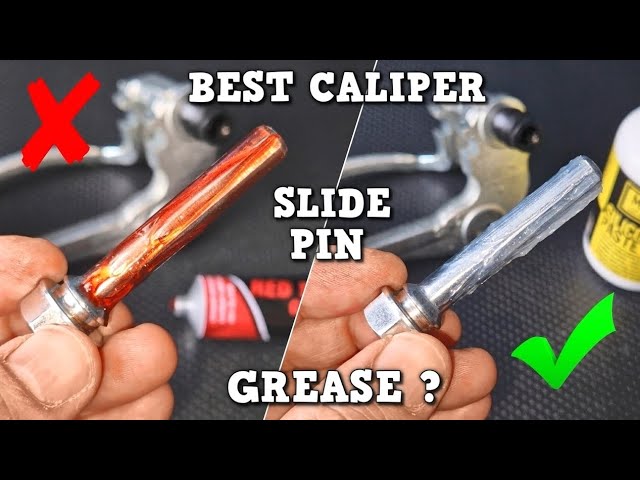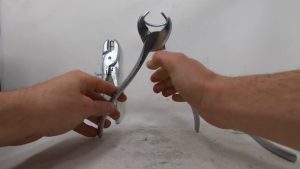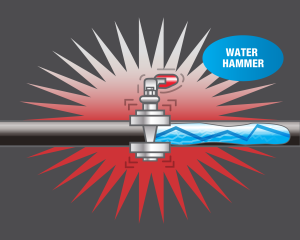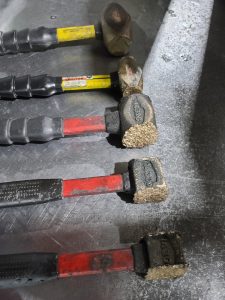Have you ever wondered why your car’s brakes don’t feel as smooth as they should? It might be time to pay attention to an often-overlooked component: the brake caliper guide pin grease.
This small but mighty element plays a crucial role in ensuring your vehicle’s braking system operates flawlessly. By understanding its importance, you can enhance your driving experience and ensure your safety on the road. Imagine driving with the confidence that your brakes will respond instantly, every single time.
That’s the power of well-greased brake caliper guide pins. They help maintain the perfect harmony between the caliper and the brake pads, preventing uneven wear and tear. But how do you know if your guide pins need greasing, and what’s the best way to do it? Stick around as we dive deeper into the secrets of brake caliper guide pin grease and reveal how you can keep your brakes performing at their best.
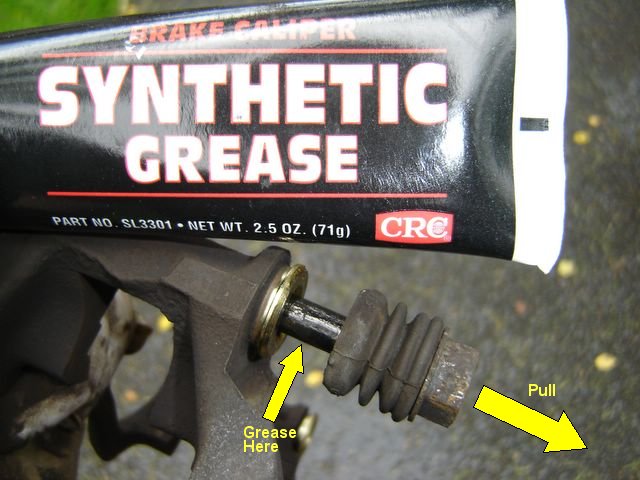
Credit: bobistheoilguy.com
Importance Of Brake Caliper Guide Pin Grease
Brake caliper guide pin grease is vital for vehicle safety. It ensures smooth brake operation. Proper lubrication prevents metal-on-metal contact. This reduces wear and tear. Neglecting this can lead to braking issues. It can even cause accidents. Regular maintenance with the right grease is essential. It keeps brakes efficient and reliable.
Why Proper Lubrication Matters
Guide pins allow brake pads to move freely. Without grease, they can stick. This affects brake performance. Sticking can cause uneven pad wear. It might also lead to noise during braking. Proper lubrication ensures even pressure distribution. This results in smoother and safer stops.
Protecting Against Corrosion
Brake components are exposed to harsh conditions. Moisture and dirt can cause corrosion. Grease acts as a protective barrier. It prevents rust and corrosion. This extends the lifespan of brake parts. Regular application keeps the system in top shape.
Reducing Maintenance Costs
Unlubricated guide pins can lead to costly repairs. Worn-out parts may need replacement. Proper lubrication minimizes these risks. It reduces the need for frequent maintenance. This saves both time and money in the long run.
Enhancing Vehicle Performance
Well-lubricated guide pins improve braking efficiency. This enhances overall vehicle performance. Drivers experience smoother and quieter stops. It also boosts confidence in vehicle safety. Regular maintenance with the right grease is crucial.
Signs Of Inadequate Greasing
Brake caliper guide pin grease ensures smooth brake operation. Inadequate greasing leads to several issues, affecting vehicle safety and performance. Recognizing these signs can help maintain your car’s braking system.
1. Uneven Brake Pad Wear
Uneven wear indicates poor caliper movement. This happens when guide pins lack proper grease. Regularly check brake pads for uneven thinning. This can prevent costly repairs.
2. Squeaking Or Grinding Noises
Squeaking sounds can signal dry guide pins. Grease reduces friction between parts. Grinding noises may mean metal contact. Immediate attention is crucial to avoid damage.
3. Vehicle Pulling To One Side
Improper greasing can cause one brake to drag. This results in the vehicle pulling to one side. Safe driving requires balanced braking. Ensure guide pins move freely.
4. Increased Brake Pedal Effort
Hard brake pedals suggest stuck pins. Grease ensures smooth pin movement. This reduces pedal pressure needed for braking. Check pins if braking feels difficult.
5. Frequent Overheating
Inadequate greasing can lead to overheating brakes. Friction generates excess heat. This affects brake performance. Proper lubrication helps dissipate heat efficiently.
6. Vibrations During Braking
Vibrations indicate uneven caliper pressure. This can stem from dry guide pins. Check for vibrations when slowing down. It ensures effective braking and vehicle safety.
Types Of Grease For Guide Pins
When maintaining your vehicle’s brake system, choosing the right grease for guide pins is crucial. But with so many options, how do you decide? The type of grease you select can significantly impact the performance and longevity of your brake calipers. Let’s break down the different types you can choose from.
Synthetic Vs. Conventional
Synthetic grease is often praised for its superior performance. It tends to last longer and handles extreme temperatures better. This means fewer breakdowns and more peace of mind.
Conventional grease, on the other hand, is usually more affordable. It gets the job done but may require more frequent applications. If you’re on a budget, this might be your go-to.
Have you ever found yourself stranded with failing brakes? That’s a situation synthetic grease might prevent. It’s all about weighing long-term benefits against short-term costs.
Temperature Resistance
Brake calipers can get hot, especially during intense driving. Grease that withstands high temperatures will keep your pins functioning smoothly.
Synthetic options often shine here. They maintain their consistency even when the heat is on. Conventional grease might start to break down, leading to potential issues.
Think about your driving habits. Do you often drive in stop-and-go traffic or on hilly terrain? If so, temperature resistance should be a top priority for your guide pin grease.
Water Repellency
Water exposure can wreak havoc on brake components. Grease that repels water helps keep rust and corrosion at bay.
Synthetic grease generally offers better water repellency. It forms a protective barrier, shielding the pins from moisture.
But don’t discount conventional grease entirely. Some formulations provide decent water resistance at a lower price point.
Ask yourself: How often does your vehicle face rainy conditions or waterlogged roads? Water repellency might be the feature you need to prioritize.
Choosing the right grease for your brake caliper guide pins can make a difference. Consider your driving environment and budget. Are you ready to make an informed choice that ensures safety and performance?
Steps For Proper Greasing
Properly greasing brake caliper guide pins ensures smooth operation. Clean the pins thoroughly before applying grease. Use a thin layer of high-temperature grease for optimal performance and longevity.
Proper greasing of brake caliper guide pins is crucial for ensuring the longevity and efficiency of your vehicle’s braking system. This straightforward process can save you from the hassle of unexpected brake failures, enhancing your safety on the road. Let’s delve into the simple steps for greasing your brake caliper guide pins effectively. Preparing the Work Area Before you begin, make sure your vehicle is parked on a flat surface. This prevents it from rolling while you work. Gather all necessary tools and materials, such as a socket wrench, brake caliper grease, and a clean rag. Organize them within reach to streamline the process and avoid unnecessary interruptions. Cleaning the Guide Pins Remove the brake caliper carefully using your socket wrench. This will expose the guide pins for cleaning. Wipe away dirt and old grease with a clean rag. Ensure the pins are spotless to allow the new grease to adhere properly. Inspect the pins for any signs of wear or damage. If they look worn out, consider replacing them to avoid future issues. Applying the Grease Select a high-quality brake caliper grease; this choice can impact the longevity of your braking system. Apply a generous amount of grease to the guide pins, ensuring an even coating. This reduces friction and prevents wear. Reassemble the brake caliper, making sure everything is securely in place. Test your brakes to confirm proper operation. Greasing your brake caliper guide pins is a small task with a big payoff. Have you ever been stuck on a trip due to brake issues? This simple maintenance step could be your ticket to hassle-free travels. Embrace regular greasing and enjoy smoother, safer journeys.
Common Mistakes To Avoid
Proper maintenance of your brake caliper guide pins is crucial. Yet, many make mistakes that can lead to brake issues. Understanding these common errors helps keep your vehicle safe and efficient. Below, we explore frequent mistakes to avoid when dealing with brake caliper guide pin grease.
1. Using the Wrong Type of Grease
Not all greases are suitable for brake calipers. Some may cause damage. Always choose a grease specifically designed for brake components. Silicone-based greases are often recommended for this purpose. They withstand high temperatures and resist water.
2. Overlooking Cleaning the Pins
Dirty guide pins can lead to brake problems. Before applying grease, clean the pins thoroughly. This ensures the new grease works effectively and prolongs the lifespan of the brake system.
3. Applying Too Much Grease
Excessive grease can attract dust and dirt. This can lead to clogging and reduced performance. Apply a thin layer evenly across the guide pins. This ensures smooth movement and prevents debris buildup.
4. Ignoring Regular Maintenance
Neglecting regular maintenance of brake components is a common error. Regularly check and reapply grease to the guide pins. This prevents rust and ensures optimal brake function.
5. Failing to Inspect for Damage
Worn or damaged guide pins can lead to brake failure. Inspect the pins for wear before greasing. Replace any damaged components to maintain safety and performance.
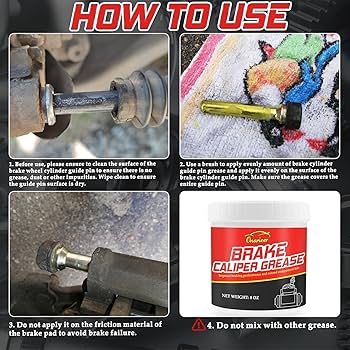
Credit: www.amazon.com
Frequency Of Maintenance
Brake caliper guide pin grease ensures smooth brake operation. Regular maintenance is crucial for safety. Grease prevents rust and wear on the guide pins. Proper lubrication reduces noise and extends brake life. Knowing when to check and reapply can save time and money.
Routine Checks
Inspect the brake caliper guide pins every six months. Frequent checks prevent unexpected brake failures. Look for signs of wear and insufficient lubrication. Ensure the pins move freely without resistance. Clean and re-grease if you notice dirt or rust.
Adjustment Based On Driving Conditions
Adjust maintenance frequency based on driving habits. City driving with frequent stops may require more checks. Off-road driving exposes brakes to dirt and moisture. Re-grease guide pins after harsh conditions. Long highway trips can extend maintenance intervals.
Tools Needed For The Job
Greasing brake caliper guide pins ensures smooth brake function and safety. Before starting, gather the necessary tools. Using the right tools makes the job easier and more efficient. Here’s a list of tools you need for greasing brake caliper guide pins.
Socket Set
A socket set is essential. It helps remove and tighten bolts. Make sure you have the right size for your vehicle. A complete set ensures no interruptions in your work.
Wrench
A wrench provides a good grip. It’s useful for loosening tight bolts. Always keep a wrench handy. It saves time and effort during the task.
Brake Caliper Tool
This tool helps push the caliper back. It creates space for applying grease. Ensure it’s compatible with your brake system. This tool simplifies the process.
Grease Gun
A grease gun applies grease precisely. It reduces mess and waste. Choose a grease gun that’s easy to handle. This tool ensures even application.
Cleaning Supplies
Keep cleaning supplies nearby. Use them to clean old grease and dirt. Rags and brake cleaner work well. Clean surfaces ensure better adhesion of new grease.
Rubber Gloves
Wear rubber gloves for protection. They keep your hands clean. Gloves also provide a better grip. Safety and hygiene should always come first.
Jack And Jack Stands
A jack lifts the vehicle. Jack stands provide support. Always use them together for safety. Ensure they are sturdy and reliable.
Benefits Of Regular Greasing
Regular greasing of brake caliper guide pins ensures smooth operation and prevents corrosion. This maintenance reduces wear and tear, prolonging the lifespan of brake components. Proper lubrication enhances braking performance, leading to safer driving experiences.
Regular greasing of brake caliper guide pins is a vital maintenance task that every car owner should prioritize. It’s not just about keeping the mechanics smooth; it’s about ensuring safety and longevity in your vehicle’s braking system. Let’s delve into how this simple yet effective maintenance routine can benefit you by improving brake performance and extending the lifespan of your brake components.
Improved Brake Performance
One of the most significant benefits of regularly greasing your brake caliper guide pins is the notable improvement in brake performance. When you apply the brakes, you expect your car to stop smoothly and effectively. However, neglected guide pins can lead to uneven brake pad wear and, consequently, a shaky or squeaky braking experience. Have you ever felt a judder when stopping your car? This could be due to dry or corroded guide pins that prevent the brake pads from engaging evenly. By keeping these pins well-lubricated, you ensure that your brakes respond promptly and evenly, reducing stopping distance and enhancing overall safety.
Extended Component Lifespan
Regularly greasing the guide pins is like giving your car’s braking system a gift of longevity. Components that move seamlessly together tend to wear less. Without the extra friction caused by dry pins, both the pads and rotors can enjoy a longer life. Think about the cost savings. Replacing brake pads and rotors can be expensive, not to mention the inconvenience of having your car out of service. By simply maintaining the guide pins with grease, you’re taking a proactive step in extending the life of these crucial parts. Are you someone who loves road trips? Imagine being miles away from home and suddenly hearing a grinding noise from your brakes. It’s not just a dent in your plans; it can be dangerous. Regular maintenance can help you avoid such scenarios and keep your adventures stress-free. Incorporating regular greasing into your car maintenance routine can transform your driving experience. So, are you ready to take the step towards a smoother, safer ride?

Credit: www.youtube.com
Frequently Asked Questions
What Is Brake Caliper Guide Pin Grease?
Brake caliper guide pin grease is a lubricant specifically designed for the smooth operation of brake caliper pins. It prevents corrosion, reduces friction, and ensures efficient braking performance. Using the right grease is crucial for maintaining the longevity and effectiveness of your braking system.
How Often Should I Apply Guide Pin Grease?
You should apply guide pin grease whenever you perform brake maintenance or notice reduced braking efficiency. Regular application during routine brake inspections helps maintain optimal performance. Always follow your vehicle’s maintenance schedule for best results.
Can I Use Any Grease For Brake Guide Pins?
No, not all greases are suitable for brake guide pins. It’s essential to use grease specifically formulated for high-temperature and metal-to-metal contact. Using the wrong grease can lead to reduced braking performance and potential damage.
Why Is Guide Pin Grease Important?
Guide pin grease is crucial for preventing wear and tear on brake components. It ensures smooth movement of caliper pins, reducing friction and noise. Proper lubrication helps maintain optimal braking performance and extends the lifespan of brake components.
Conclusion
Proper brake caliper guide pin grease ensures smooth vehicle operation. Regular maintenance prevents wear and tear. This grease reduces friction and enhances brake performance. Choosing quality grease keeps your brakes reliable. Apply grease carefully for best results. Always check the manufacturer’s recommendations for specific grease types.
Keeping brakes in top shape improves safety. Consistent care extends the lifespan of brake components. Don’t overlook this critical part of vehicle maintenance. Regular checks lead to safer driving experiences. Protect your investment with proper brake care. Stay proactive and enjoy a smoother, safer ride.

